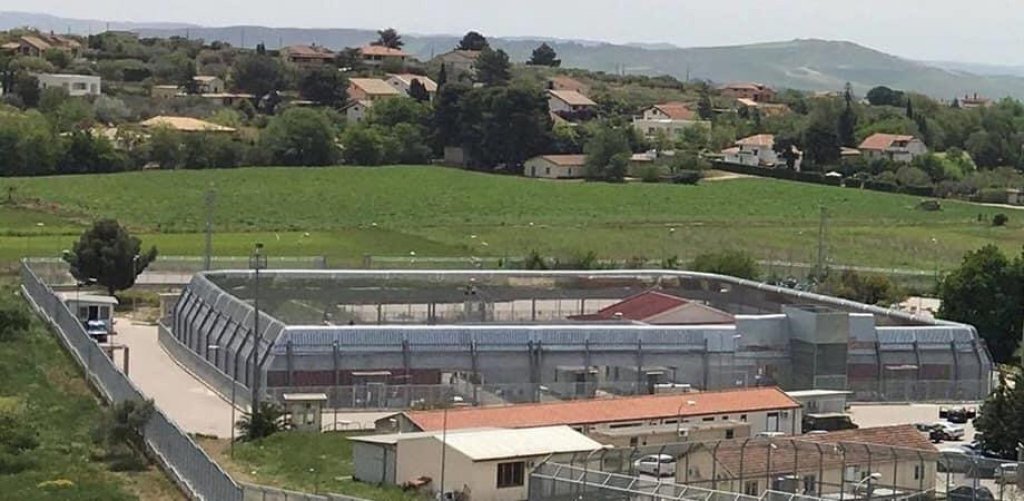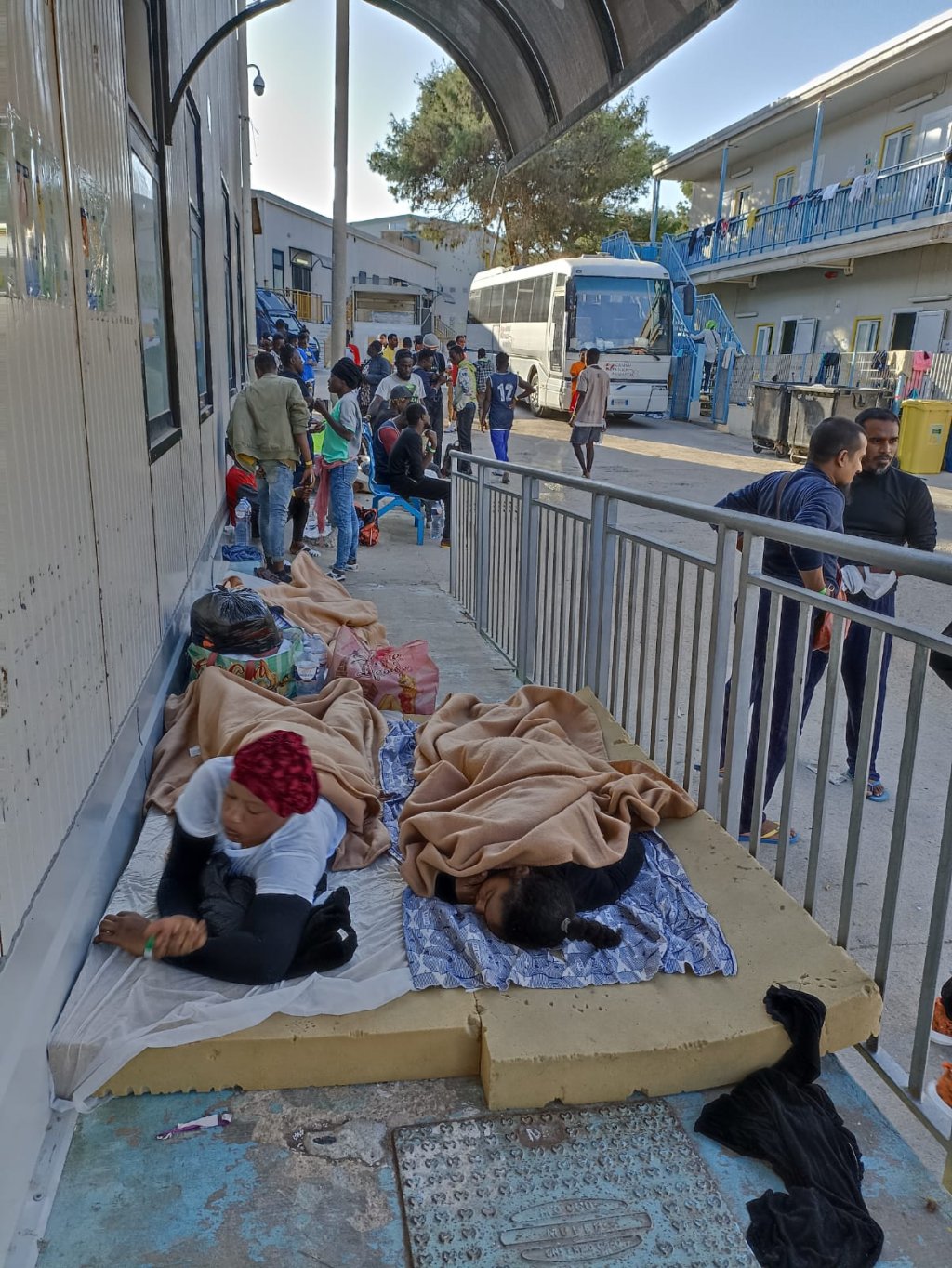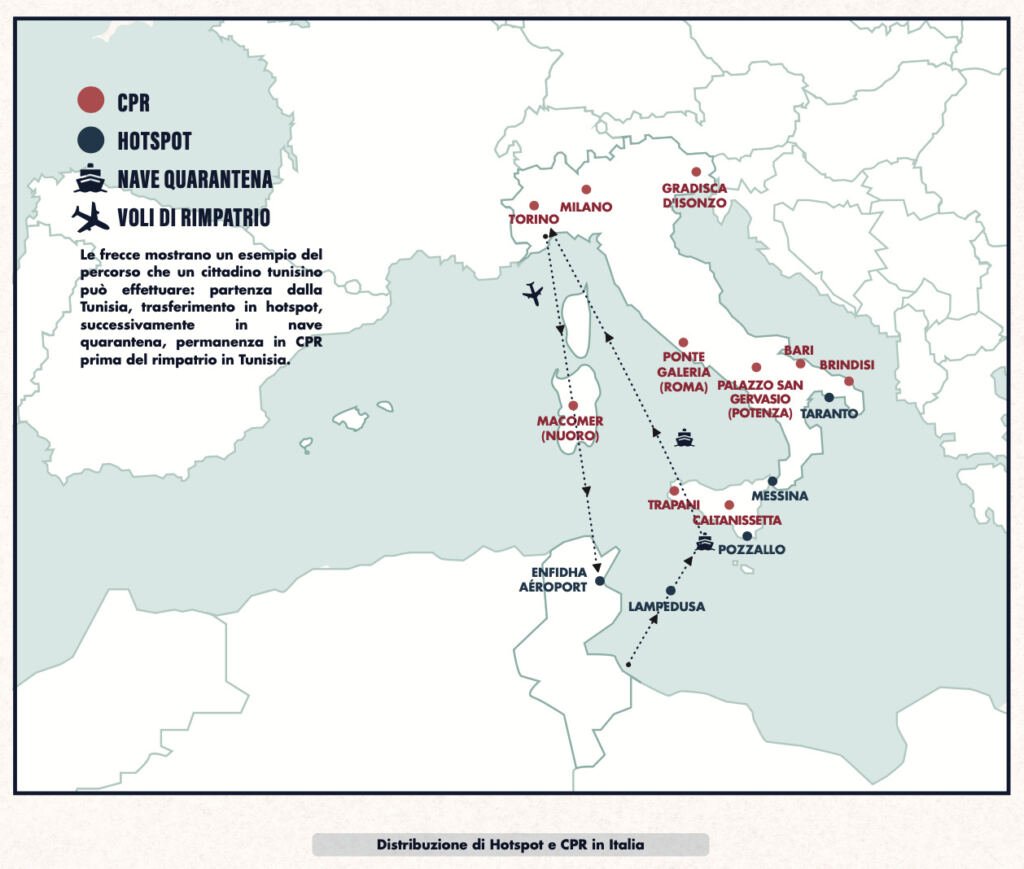On Thursday, the European Court of Human Rights (ECHR) ordered Italy to pay compensation to four Tunisians who arrived in the country in October 2017, and later were deported.
On Thursday (March 30), the European Court of Human Rights (ECHR) in Strasbourg found Italy in breach of European human rights, and ordered Italian authorities to pay compensation to the claimants in the case.
The claimants are four Tunisian migrants who attempted to travel to Italy on board a makeshift boat in October 2017, who were rescued at sea and brought to the island of Lampedusa. On arrival on Lampedusa, the court documents explain, the four migrants were taken to the migrant “hotspot” for initial identifcation, registration and interviews.
According to the court, the migrants were placed in the hotspot for ten days “during which time they allege they were unable to leave and interact with the authorities.”
The claimants also allege their treatment at the hotspot was “inhuman and degrading.”
‘Forcibly removed to Tunisia’
Later in October, the four applicants, as well as 40 other migrants, were taken to Lampedusa’s airport. They say they were given documents to sign, which they did not understand, and only found out later that these were refusal-of-entry orders, preventing them from returning to Italy.
From Lampedusa, the group say they were flown first to Palermo airport and then “forcibly removed to Tunisia.”

Because of this treatment, the ECHR found that Italy was in violation of Articles 3, 4 and 5 of the European Convention on Human Rights. Article 3 pertains to inhuman or degrading treatment, Article 5 is about the right to liberty and security, and Article 4 is about the prohibition of collective expulsion of aliens.
In particular, Italy was found to be in breach of Article 4 as it had not made any attempt to assess each person’s case separately: There were no individual interviews, and the group as a whole were given the refusal-of-entry orders.
Also read: EU fears instability in Tunisia could lead to more migration
The four migrants, states the court, are all Tunisian nationals, who were born between 1989 and 1993, and who currently live in Tunisia. Their application was first lodged with the court in April 2018.
The case was decided by a chamber of seven judges, including one from Italy.
‘Poor hygiene and lack of space’
The court noted “that the [Italian] government did not dispute the applicants’ submissions concerning the conditions (in particular poor hygiene and lack of space) at the hotspot in Lampedusa, where they had been held for ten days.”
The applicants, said the court, were effectively deprived of their liberty for the duration of the time that they were kept in the hotspot because the facility was “surrounded by bars, fences and gates, and from which they had not been able to leave lawfully.”
Also read: Tunisia’s youth focused on reaching Europe
Their ten-day detention had no “clear and accessible legal basis,” the court also found, adding that the applicants were not provided with sufficient information or given the chance to challenge the grounds for their de facto detention in front of a court.

No time to appeal decisions
Since they appeared not to have understood the orders nor been given time between signing them and boarding the plane, the court found that the applicants had not been afforded the opportunity to appeal against the decisions.
The court ordered Italy to pay each applicant €8,500 in respect of damages and €4,000 in respect of costs and expenses.
According to data gathered by the Italian organization ASGI (The Association for Juridical Studies on Immigration), expulsion orders against Tunisian citizens migrating to Italy increased between November 2020 and January 2021.
In fact, according to an ASGI study released in 2022, Tunisian citizens constituted 80.5% of foreign citizens transiting through the Detention and Repatriation Centers (CPR) in Italy, and 75.5% of foreign citizens repatriated from Italy.
‘Perfect machine’
The human rights NGO Borderline Sicilia called the system for repatriation of Tunisians in Italy a “perfect machine.”
Italy and Tunisia signed an agreement, according to which Tunisia is considered a ‘safe’ country by Italy, meaning that most Tunisian citizens are excluded a priori from international protection.
This signifies that their repatriation can take place via an accelerated procedure.

During the COVID-19 pandemic, the repatriation of Tunisian migrants appeared to be facilitated argues ASGI. Most Tunisian migrants arriving in Italy during the pandemic were first taken to a hotspot for identification.
From there, they would be taken to a CPR and put on a quarantine ship for the mandatory isolation period.
Also read: Citizens of a ‘safe country,’ Tunisian migrants in Italy
Borderline Sicilia describes the quarantine ship as an “antechamber of the repatriation to complete the legal channelling phase of the hotspot procedure: the time spent in the ship served to complete the selection of foreign citizens, distinguishing between ‘asylum seekers’ and ‘economic migrants,’ between those who have access to reception and those who are expelled.”
Once citizens left the quarantine ship, organizations like Borderline Sicilia say that most Tunisians were asked to sign a document without any explanation or access to information. They were not given the opportunity to tell their personal story or even apply for international protection. They were then typically issued with a removal order and asked to leave Italy within seven days.
Stories of Sami, Wissem and Bilel
An article from 2022 by Borderline Sicilia highlighted the cases of three Tunisian men who had all been detained in CPRs in Italy. Two of them died during their detention or soon after.
Borderline Sicilia writes that one of them was detained for two months in a CPR near Trapani. During his time in detention, “Sami* repeatedly self-harmed, stitching his eyelids, lips and genitals together.” After he threatened to hang himself, he was eventually released and was able to join his family in Europe.
Another Tunisian migrant, Wissem*, died during psychiatric restraint at the San Camillo hospital in Rome. The 26-year-old from Kebili in Tunisia was reportedly “sedated and tied hand and foot to a hospital bed, after having passed through the Ponte Galeria CPR, where he was detained.”
Lastly, Borderline Sicilia also told the story of Bilel*, a 20-year-old Tunisian from Sfax who was reported to have died in May 2020 while he was in quarantine on the ship Moby Zaza, which was moored off Porto Empedocle in Sicily.
Since the beginning of 2023, according to the Italian government’s own data, more than 27,000 migrants in total have arrived by boat on Italy’s shores. 1,862 of them are registered as Tunisian nationals.
Source: infomigrants















